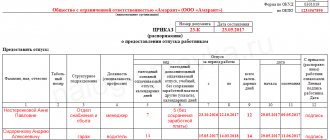Home / Labor Law / Responsibility / Material
Back
Published: 05/14/2016
Reading time: 9 min
0
9257
Fining is one of the most common methods of motivation used by employers in relation to their subordinates.
Numerous fines are taken for granted by both sides of the working relationship.
But is it legal? Let's find out!
- What does the law say about fining employees?
- Why do employers fine employees?
- What should a fined employee do?
- Employer's liability for fines to employees
- Alternative penalties
Why are workers fined?
The areas of activity of different organizations differ, so there is no unified system of fines.
The most common reasons for foreclosure include:
- long absence from work without warning (more than three hours);
- premature departure;
- being late;
- dress code violation;
- complaints from customers;
- failure to implement the plan;
- use of official communication means for personal purposes.
Some employers use a detention system for violating internal regulations.
What the law says about the application of fines
The Labor Code of the Russian Federation does not allow the imposition of penalties that are not provided for by federal legislation and regulations on discipline. Penalties are not included in the list of disciplinary penalties.
Deductions from wages (Article 137 of the Labor Code of the Russian Federation) can be made in the following cases:
- refund of advance;
- reimbursement of overpaid amounts;
- refund for used but unfulfilled vacation.
The employer has the right to apply monetary penalties if damage to the organization's property is caused through the fault of an employee. Chapter 39 of the Labor Code of the Russian Federation regulates issues of financial liability of employees.
The legislation distinguishes between two types of property liability. Full financial liability implies recovery of the entire amount of damage. In this case, the employee signs a document in advance confirming full compensation for harm. If an agreement has not been concluded, the amount of deductions is limited to the amount of average monthly earnings (Article 241 of the Labor Code of the Russian Federation).
Can a boss fine an employee?
Fines at work according to the Labor Code - deductions from employees' salaries are allowed only with their written consent, issued in the form of an application.
Certain positions require the conclusion of an agreement between the employer and the employee on full or partial responsibility for the goods and equipment entrusted to the contractor. In this case, if the financially responsible person violates the company’s labor regulations, punishment in the ruble is also legal.
But whether the employer has the right to fine an employee with money by including the corresponding regulations in the list of regulatory documents for internal use can be understood from the following provisions:
- the state labor inspector has the right to issue an order to the head of the company to eliminate the violation of the Labor Code if the rules on fines for being late to work are approved by the director;
- Failure to comply with the instructions of the state inspector entails sanctions provided for in Art. 5.27 Code of Administrative Offences. This is an administrative liability in the form of a fine: for officials and individual entrepreneurs - from 1 to 5 thousand rubles, for legal entities - 30-50 thousand. At the same time, the supervisory authority may suspend the activities of the enterprise for a period of up to three months;
- systematic fines against company employees are regarded as partial non-payment of wages. Law enforcement agencies intervene in the situation if the violation lasts longer than three months. If self-interest is established in the actions of the director or chief accountant, a criminal case is initiated against them.
From the points listed in the list, it is clear that not a single manager will officially establish a system of fines in the company. It is possible to motivate employees to conscientiously perform their duties by reducing the size of the incentive part of the salary - bonus.
Expert opinion
Irina Vasilyeva
Civil law expert
Depreciation of an employee is a fine unofficially issued by the boss to a negligent employee. A bonus made dependent on labor discipline does not contradict the code.
Types of disciplinary sanctions
Article 192 of the Labor Code of the Russian Federation establishes the measures of influence that are applied when a disciplinary offense is committed.
The list of penalties that can be imposed on an employee includes:
- Comment.
- Rebuke.
- Dismissal.
For certain categories of workers, the legislation provides for additional types of punishment (for example, deprivation of the right to drive special vehicles).
The type of penalty in each specific case is determined by the essence of the violation.
A reprimand is the simplest form of punishment. It is used in cases of minor disciplinary offenses (for example, being a few minutes late) and is expressed verbally.
For violation (or failure to fulfill) official duties, the employee is reprimanded. Unlike a remark, the fact of a violation is recorded in writing (order or instruction).
The most serious punishment is dismissal.
Among the main reasons for dismissal, the Labor Code (Article 81) indicates:
- absenteeism (failure to appear or prolonged absence from work);
- repeated violation of labor duties (with a valid disciplinary sanction);
- showing up at work while intoxicated;
- loss of trust in the employee on the part of the employer.
Important! Dismissal for reasons that are not established by law is considered a gross violation.
Deprivation of bonus
Article 192 of the Labor Code of the Russian Federation contains an exhaustive list of options for disciplinary punishment. The labor code does not provide for the possibility of monetary penalties. Many employers use deprivation of bonuses (deprivation of bonuses) as punishment for employees.
Read also: Law on Immunoprophylaxis
Salaries in most organizations consist of a base part (salary) and incentive payments (Article 129 of the Labor Code of the Russian Federation). The salary cannot be less than the minimum wage (minimum wage). The law does not regulate the payment of additional amounts.
In most organizations, the conditions for calculating bonuses are set out in local regulations (for example, in a collective agreement or in internal regulations). At the same time, the document includes a clause stating that material incentives are paid in the absence of disciplinary sanctions.
The presence of a bonus system provides the employer with the opportunity to fine employees legally. However, deprivation of the bonus must be motivated. If a conflict situation arises, the employer is obliged to confirm the fact of the violation.
"Voluntary" fines
In some organizations, conscientious employees, on their own initiative, introduce a penalty-like system in order to improve work culture and efficiency. They can themselves develop and propose a procedure and amount that will be given to “violators” of certain rules, for example, foul language or smoking in unauthorized places. The funds collected go towards public needs: a useful purchase for the office, a communal lunch or entertainment at the end of the month, etc.
Important
The amount that employees pay as such a “fine” should not be deducted from their wages; it can only be given from their own pocket, after the employee has received the funds due to him from the employer.
Such a “penalty system” is no longer an administrative impact, but a kind of game, which, with voluntary participation, does not contradict the law and can be very effective for public discipline.
Employer's liability
Labor legislation prohibits the use of financial sanctions for disciplinary violations.
Employee fines may expose the organization to administrative liability. The following punishment is provided for non-compliance with the law (Administrative Code of the Russian Federation, Article 5.27, part 1):
- for individual entrepreneurs - a fine of up to 5,000 rubles;
- for officials (managers) - a fine of up to 5,000 rubles;
- for legal entities (organizations) - a fine of up to 50,000 rubles.
Regular application of penalties may lead to criminal prosecution of the perpetrators.
How can an employee protect his rights?
An employee has the right to demand compensation for material damage if deductions from his wages are made illegally.
If the employer refuses to resolve the conflict voluntarily, the employee may:
- contact the labor inspectorate;
- write a complaint to the prosecutor's office;
- file a claim in court.
The applicant must confirm the fact of the violation (for example, provide a payslip indicating deductions or a bank statement). If there is a clause in the employment contract regarding the deprivation of bonuses for violation of discipline, the employer’s actions are considered lawful.
If a company practices issuing “gray” salaries, it is almost impossible to prove the application of penalties.
In addition, the bonus implies payments from the organization’s profits. At the same time, the employer is not obliged to report to staff about the reasons for the deductions.
Is negative motivation effective?
Reward is always more effective than punishment, although in some cases the latter cannot be avoided.
This is also important to know:
What consequences do employers face if they conceal a work-related injury?
Deprivation of something reinforces the wrong model of behavior in the consciousness of the person being punished, without providing an alternative to the correct one (the employee understands how he should not have acted, but only feels regret for being caught, and not for committing the offense itself).
Free legal consultation We will answer your question in 5 minutes!
Call: 8 800 511-39-66
The employee does not have an incentive to improve and do as the employer demands; there is a possibility that tricks aimed at avoiding punishment can only be improved.
Free legal consultation
We will answer your question in 5 minutes!
Ask a Question
Possible negative consequences for the employer of applying “monetary” penalties:
- Having paid the fine (losing the bonus), the employee continues to commit similar violations - after all, they have already been “paid”;
- if the deduction amount is acceptable for the employee, he will pay it; if it is unacceptable, he will quit and the company will lose the employee;
- people of creative professions and rare specializations, having been subjected to such crude and “primitive” sanctions from their point of view, will be extremely demotivated by the formal approach to their activities;
- Only impeccable performers will stay in the company, and the creative and enterprising contingent will not want to put up with money pressure;
- Having quit, an employee who is constantly under such pressure will retain anger and resentment towards the former employer, which can be spread among clients and partners, on social networks, etc.
If deprivation of bonuses for disciplinary violations has become a regular practice in the organization, this indicates some problems in management and contact between management and staff. Forming a respectful attitude is much more effective than constant pressure in the form of fear of financial deprivation.









